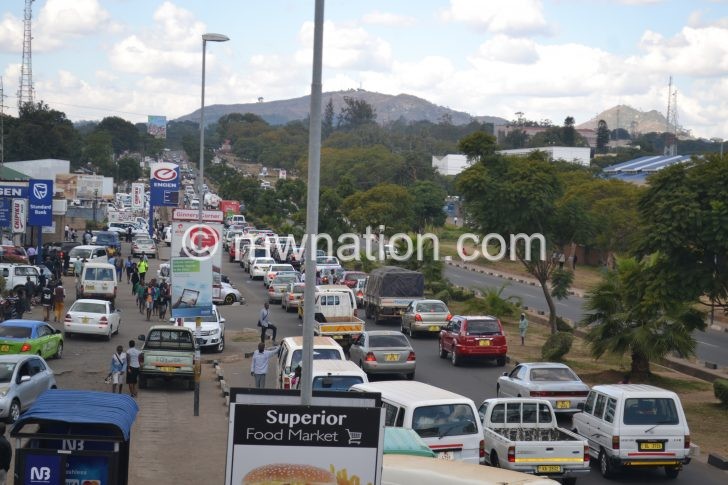Communicating dangerously
It is getting crazy! Fuming onlookers scream expletives as a saloon almost rams into a woman crossing pedestrian stripes on Masauko Chipembere Highway in Blantyre.
That’s close!
Eyewitnesses whistle, boo and hoot as the driver was texting, with elbows on the steering wheel, when the vehicle violently screeched to a stop-leaving tyre prints and fumes of burning rubber.

“Are we safe?” asks the perturbed pedestrian after her miraculous escape. “Will walkers ever be safe if those with cars cannot stop for a second at a pedestrian crossing?”
The frustrated Mbayani resident Elisa Ngwenya is rushing to Queen Elizabeth Central Hospital (QECH) to donate blood to her pregnant cousin.
But it is not a class struggle or about haves and have-nots.
The near miss exposes a constant threat on the country’s roads where over 1 000 die every year.
In the hospital’s vicinity, university students at the Polytechnic in 2012 torched a truck which killed two.
But the costly losses sometimes begin with a mere phone and little attention to mishaps on the road, followed by sudden brakes, swerves, clashes, pile-ups, impatient hooting from impatient motorists peeping out to figure out the cause of the jam.
Road carnage
The Directorate of Road Traffic and Safety Services (DRTSS) reports that 5 406 road accidents killed 1 122 people last year.
Blantyre recorded 126 deaths largely attributable to over-speeding, mistimed overtakes and drunken driving.
But DRTSS spokesperson Angelina Makwecha says the carnage can be averted by abstaining from mobile phones while driving.
“Use of phones on the move is a major cause of worry. It is not easy to tell the number of accidents caused by this and no driver admits taking a call or texting when accidents occur, but it is a distraction which causes the majority of accidents,” says Makwecha.
Do you Facebook? Your followers always want to know what is on your mind. Do you Tweet? You can share and encounter things happening around you in 140 characters or less. WhatsApp? A barrage of texts, videos and pictures from friends can be inescapable.
When driving, the vehicle requires you to ignore all the ringtones, beeps and vibrations-eyes on the road.
Just when smartphones have become virtually everything, the impact of driving while connecting with people across the globe is an awful mistake.
Forget drink-driving.
Text-driving in the country is becoming rampant.
However, many travellers run the risk of being killed by accidents.
In a lunch-hour rush on Masauko Chipembere Highway, we saw some drivers taking the risky obsession to scary levels.
As vehicles sped past a neglected pedestrian crossover at QECH, a startling 12 in 100 motorists driving towards Limbe had their phones in hand, either texting or making calls.
By contrast, 18 in 100 driving in the opposite direction actually had the gadgets at their fingertips or glued to their ears.
This means some travellers in nearly 85 in every 100 vehicles could be at a risk of avoidable accidents because the eyes of the extremely tech-savvy 15 are scarcely off their devices.
Some of those seen texting while driving had a phone in each hand just when their hands were supposed to be firmly on the steering wheel and eyes figuring out their way in the mazy traffic jam.
Owning two phones is common as telecommunication services remain unreliable, with exorbitant costs of calling across networks.
But drivers with divided attention left their vehicles dangerously veering from one lane to another as did the one which narrowly missed Ngwenya before it slammed into a stationary minibus at QECH.
“WhatsApp!” bellowed a minibus conductor, asking: “Do you want to kill innocent people because of messaging?”
Phones have become an indispensable part of life. It is transforming how people live, invest and access vital services.
A Malawi Communications Regulatory Authority (Macra) study shows that nearly 36 in 100 people in the country own a phone—and a third of the connected population has access to Internet.
Beyond technology
But some usage of mobile technologies can be suicidal.
Some Blantyre-based traffic police officers said out of 10 drivers on M1 Road, “one or two” are captured using phones while driving out of every 10.
This hints at a hazardous appetite to stay connected and informed while on the move.
Some States in the US trialled a device to detect phone usage just as speed traps sense overspeeding, but it faced legal questions.
For motorists mobile phones constitute the single most important digital tool to turn to in times of accidents and breakdowns.
But road traffic regulators urge drivers to use them cautiously.
Makwecha warns: “The big issue is not whether traffic police can detect the growing tendency, but the risks involved. Many deaths, injuries and losses on our roads would have been avoided if drivers had stayed alert and kept their hands off mobile phones for a second,”





